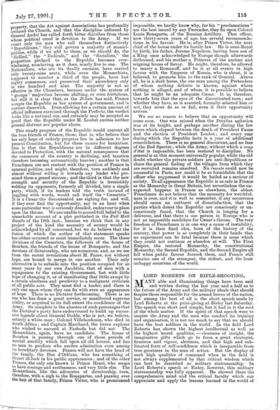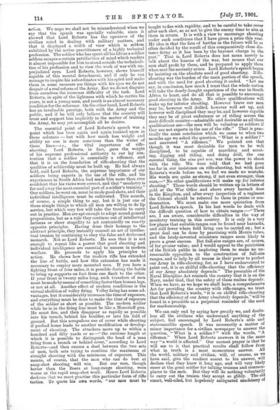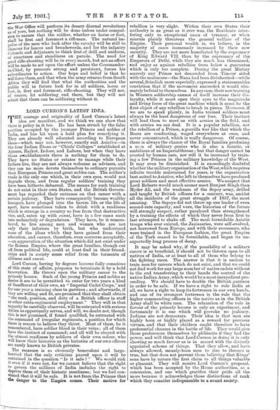LORD ROBERTS ON RIFLE-SHOOTING.
MANY able and illuminating things have been said and written during the last year and a half as to the future of the Army and the military ideals that should iiispire those responsible for the armed forces of the nation, but among the best of all is the short speech made by Lord Roberts at the prize-giving at Bisley last Saturday. The speech was short and simple, but it had in it the root of the whole matter. If the spirit of that speech were to inspire the Army and the men who conduct its training and organisation, it is not too much to say that we should have the best soldiers in the world. In the field Lord Roberts has shown the highest intellectual as well as the highest moral qualities, — clearness of insight, the imaginative gifts which go to form a great strategist, firmness and vigour, alertness, and that high and sub- limated form of self-confidence which is inseparable from true greatness in the man of action. But the display of such high qualities of command when in the field is not always supplemented by that critical wisdom which can best be described as military statesmanship. In Lord Roberts's speech at Bisley, however, this military statesmanship was fully apparent. He showed there the comprehensive mind and the critical faculty which can appreciate and apply the lessons learned in the. world of actien. We nope we shall not be misunderstood when we say that the speech was specially valuable, since it showed that Lord Roberts has the openness of the civilian mind in dealing with military matters, and that it displayed a width of view which is seldom exhibited by the active practitioners of a highly technical profession. The soldier who has spent all his life as a soldier seldom escapes a certain petrifaction of mind which renders it almost impossible for him to stand outside the technicali- ties of his profession and to view the work of war with un- prejudiced eyes. Lord Roberts, however, shows himself capable of this mental detachment, and if only he can manage to inspire his subordinates with his spirit and make them in some measure see things with his eyes we do not despair of a real reform of the Army. But we do not disguise from ourselves the immense difficulty of the task. Lord Roberts, in spite of the lightness with which he carries his years, is not a young man, and youth is an almost necessary condition for the reformer. On the other hand, Lord Roberts has an invaluable prestige, both with the Army and the public, and if he will only believe that the country will trust and support him implicitly in the matter of training the Army, he may yet accomplish all he desires.
The essential point of Lord Roberts's speech was a point which has been again and again insisted upon in these columns — but with how much less weight and ability no one is more conscious than the writer of these lines--i.e., the - 'vital importance of rifle- shooting. Lord Roberts, in fact, gave the weight of his supreme professional authority to our lay con- tention that a soldier is essentially a rifleman, and that it is on the foundation of rifle-shooting that the qualities of soldiership must be built up. He had always held, said Lord Roberts, the supreme importance of our soldiers being experts in the use of the rifle, and his experiences in South Africa had made him more than ever confident that his views were correct, and that "musketry is far and away the most essential part of a soldier's training." Our soldiers, he went on, must be made good shots, and their individual intelligence must be cultivated. This sounds, of course, a simple thing to say, but it is just one of those simple things to which all men are willing to do lip service, but which very few will take the trouble to carry out in practice. Men are apt enough to adopt sound general propositions, but as a rule they continue out of intellectual laziness or sheer stupidity to act contentedly on exactly opposite principles. Having done their homage to the abstract principle, they instantly commit an act of intellec- tual treason by continuing to obey the false and dethroned monarch. Not so Lord Roberts. He sees that it is not enough to repeat like a parrot that good shooting and individual intelligence are essential to success in modern warfare. He proceeds to apply his principles to action. He shows how the modern rifle has extended the line of battle, and how this extension has made it necessary to employ more mounted men. If you have a fighting front of four miles, it is possible during the battle to bring up supports on foot from one flank to the other. If your front is twenty miles long, such transfers of men must be ma,debymeans of something fasterthan human legs, or not at all. Another effect of modem conditions is the virtual abolition of volley firing. Volley firing has some ad- vantages, but it considerably increases the time of exposure, and everything must be done to make the time of exposure of the soldier as short as possible. The modem soldier while he is in the firing line must be like a Moncrieff gun. He must fire, and then disappear as rapidly as possible into his trench, behind his boulder, or into his fold of ground. But this scrupulous use of cover while shooting if pushed home leads to another modification or develop- ment of shooting. The attackers move up to within a hundred and fifty yards or so—" the extreme length at which it is possible to distinguish the head of a man firing from a trench or behind cover," according to Lord Roberts—and then ensues a duel between the two sets of men, both sets trying to combine the maximum of straight shooting with the minimum of exposure. This means, of course, that the men who can do best at snap-shot shooting will win. But our men, though better than the Boers at long-range shooting, were worse at the rapid snap-shot work. Hence Lord Roberts declares that we must practise this particular form of rifle tactics. To quote his own words, " our men must be taught to fire with rapidity, and to be careful to take cover after each shot, so as not to give the enemy time to aim at them in return. It is with a view to encourage shooting under such conditions that I have given a prize this year. i My idea is that the fate of battles in the future will be as often decided by the result of this comparatively close dis- tance firing as it has been by the bayonet charge in the past." That is, Lord Roberts does not mean merely to talk about the lessons of the war, but means that our men shall profit by them, and be prepared to apply them when next the necessity arises. Lord Roberts's speech began by insisting on the absolute need of good shooting. Rifle- shooting was the burden of the main portion of the speech, and with the need for good shooting it ended. "Let me say, in conclusion, how much I trust that the whole nation will take the dearly-bought experience of the war in South Africa to heart, and do all that is possible to encourage good shooting in the Army. No other qualifications will make up for inferior shooting. However brave our men may be, however well drilled, however well set up, and however well disciplined they maybe, and however capable they may be of great endurance or of riding across the most difficult country—admirable and desirable as all these qualifications are—the men will be valueless as soldiers if they are not experts in the use of the rifle." That is prac- tically the same conclusion which we came to when two months ago we asked the question, " What is a soldier ? " and answered "A rifleman." We pointed out that though it was most desirable for men to be well disciplined, to be capable of marching and scout- ing, digging and riding, and doing drill, the one essental thing, the sine qud non, was the power to shoot with the rifle. We were -told- that we had gone too far in our insistence on rifle-shooting, but with Lord Roberts's words before us, we feel we made no mistake. His words are quite as strong, if not even stronger, than ours,—" No other qualifications will make up for:inferior shooting." Those words should be written up in door Office gold at the War Offi and above every in the Kingdom, and after every inspection of a regiment the Colonel should be referred to them in praise or con- demnation. We must make one more quotation from Lord Roberts's speech. In his last words he deals with the difficult question of how to obtain ranges :—" There are, I am aware, considerable difficulties in the away of musketry training in this country. It is only in a very few places that suitable ranges can be found near barracks, and still fewer where field firing can be carried on ; but a great deal can be done by ,practising with Morris tubes, and the lately-invented miniature ranges seem likely to prove a great success. But full-size ranges are, of course, of far greater value; and I would appeal to the patriotism 'of the British public in imploring them to make no• un-• reasonable opposition to the construction of full-size ranges, and to help by all means in their power to perfect our Army in rifle-shooting, for, as I have endeavoured to point out, it is on skilful rifle-shooting that the efficiency of our Army absolutely depends." The preamble of the Naval Discipline Act reminds the country that it is on the Navy, under God, that the safety of these realms depends. When we have, as we hope we shall have, a comprehensive Act for providing the country with rifle-ranges, we trust that Lord Roberts's words, "it is on skilful rifle-shooting that the efficiency of our Army absolutely depends," will be found. in a preamble as a perpetual reminder of the need for marksmanship.
We can only end by saying how greatly we, and doubt- less all the civilians who understand anything of the subject, feel encouraged by Lord Roberts's -able and statesmanlike speech. It was necessarily a matter of minor importance for a civilian newspaper to answer the question, "What is a soldier ? " with the words, " A rifleman." When Lord Roberts answers it in the same way " a world is affected." Our earnest prayer is that he will see to it that practical results shall follow from what in truth is a most momentous answer. All the world, military and civilian, will, of course, as we have said, give the readiest assent to his answer, will declare that they knew it long ago, and will very likely sneer at the great soldier for talking truisms and common- places to the mob. But they will do nothing voluntarily to carry out the truism they accept so glibly. The old smart, well-oiled, but hopelessly antiquated machinery of the War Office will perform its dreary diurnal revolutions as of yore, but nothing will be done unless under compul- sion to ensure that the soldier, whether on horse or foot, shall be first • and foremost a rifleman. The natural im- pulse of the men who look after the cavalry will be still to clamour for lances and broadswords, and for the infantry Colonels and Adjutants to think first of drill and uniform, of smartness and steadiness on parade. The need for good rifle-shooting will be in every mouth, but not an effort will be made to act upon the effort unless the Commander- in-Chief, by pressure strong and persistent, forces his subordinates to action. Our hope and belief is that he will force them, and that when the army returns from South Africa they will find that what the authorities and the public will in future look for in all soldiers, horse or foot, is, first and foremost, rifle-shooting. They will not, of course, let soldiering end there, but they will not admit that there can be soldiering without it.




































 Previous page
Previous page